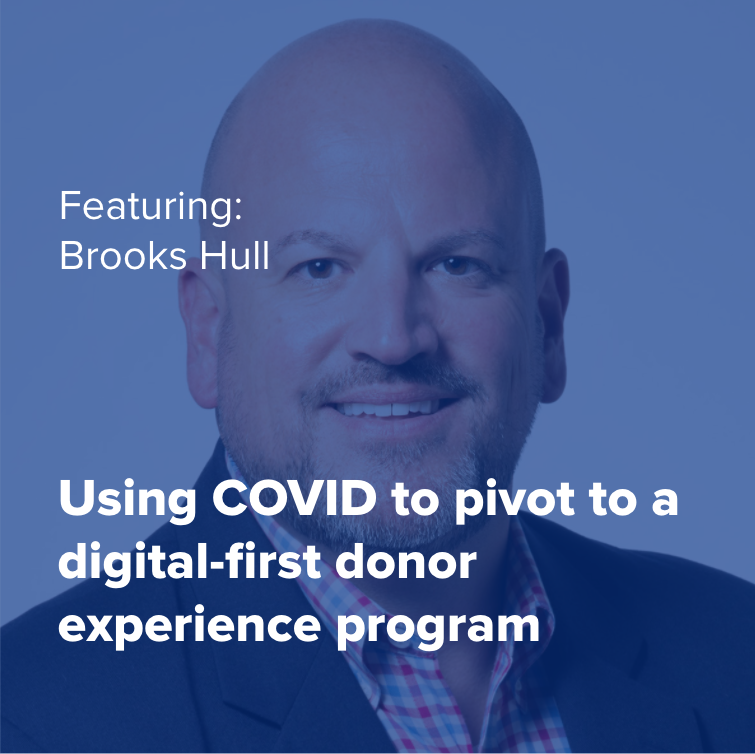On the latest episode of the RAISE Podcast, Brent sat down with Brooks Hull, VP of University Advancement at Louisiana Tech University.
Brooks started his development career at his alma mater, the University of Oklahoma, before leading the shop at Austin College. He’s been in his current role at Louisiana Tech for five years, helping the university close its largest campaign and launching a donor experience program with EverTrue.
In this conversation, Brent and Brooks talk about the importance of career mentors and building a “personal board of directors,” best practices for donor qualification calls on Zoom, how to scale the major gift experience to thousands of new donors, and how to keep students at the center of everything fundraisers do.
Establish a personal board of directors. They’ll help you navigate tough decisions and address your blind spots. (13:00 – Watch / Listen)
“I haven’t always had [a personal board of directors] and I needed it,” Brooks said. “It’s always good to have people in your corner, telling you the right path to take. That was a void for me for years. But as you learn the lessons of both success and failure, you start to develop people who stick with you.
You don’t ever grow out of a good relationship. And you always need someone to mentor you in certain areas and sometimes you need somebody to help identify where your blind spots are. That’s a key to where I am today.”
Establishing mentors and building a personal board of directors doesn’t mean you have to have formal meetings with a half-dozen people every week. But it does mean being intentional about seeking out people you can trust who can help you navigate big career and life decisions.
See COVID as an opportunity to pivot to a digital-first donor experience program. They’ve done that at Louisiana Tech and they’re reaching thousands of more donors. (33:20 – Watch / Listen)
Brooks talked about the thought behind launching Louisiana Tech’s donor experience program, DXO program for short, which enables the Foundation to delight, steward, retain, and qualify hundreds of donors who previously didn’t have a personal, one-to-one fundraising connection with the university.
“I think [COVID] gave us a realization of how much more we could accomplish. It gave us the opportunity to do much more donor engagement because the day-to-day tasks that took our attention away from what was most important was gone.
We’ve talked about how comfortable we have become with and what it can mean by having a more comfortable relationship early on with underdeveloped prospects.
If I could do this (Zoom conference) nine times a day for internal meetings, then what could I do in 15-minute windows or 30-minute windows to introduce myself [to donors]? And what are the technology tools that already exist that I could embrace and learn how to maximize my impact?
I could probably see 10 times the people that I typically see.
For years in the old models, fundraisers tried to round up as many prospects as we could. And the reason we did that was we didn’t want anybody else to get them!
I’m guilty of that. I know how to set up prospect pools to where they look productive, but it’s just picking up checks.
So what if we could change that philosophy? And what if I said I’m going to open up the floodgates and say that if you can go get somebody that is going to benefit our program, then go get them?
It was a freeing moment that we completely embraced and I think it’s so it’s really shown us strategies for going forward.”
Get to know students. They’ll provide daily inspiration and help you see the impact of your work. (21:54 – Watch / Listen)
At Louisiana Tech, Brooks and the team make sure students are actively involved with the Foundation. There’s a student philanthropy organization and student workers (in “normal” years), which helps remind fundraisers why they do what they do on a daily basis and who benefits from philanthropy. Brooks also teaches a class for first-year students, which keeps him personally connected and inspired.
“You get up every day with the understanding of what’s really at stake,” Brook said. “That’s because the graduates of Louisiana Tech University go on to do grand things. It’s a real joy for us to develop relationships with people who are typically self-made…
We’ve hired some students who are now on our staff, but the thing that’s been most key in keeping my feet on the ground is our first-year experience class. It’s a freshman-level orientation that I teach in the first quarter. I typically have 35 students without declared majors. We spend a lot of time on group work and on communication and getting them acclimated to the institution.
But just as important to me is the emotional reward that I get from finding out more about them and where they’re from. That’s where you really get a picture of what students really look like, who wants to go to college, and who needs help to get there.
That’s the constant reminder that we all should embrace — that what we do matters. And the reason that we get to do it is because those kids need us and their world-changers.”
Subscribe to the RAISE podcast for weekly conversations with advancement leaders and innovators. Available on Apple Podcasts, Spotify, Stitcher, or wherever you love to listen.
